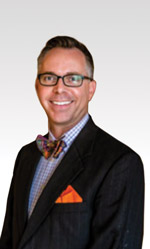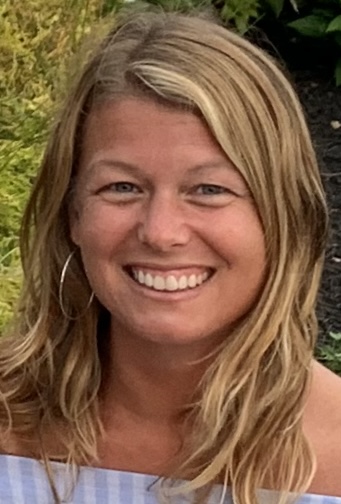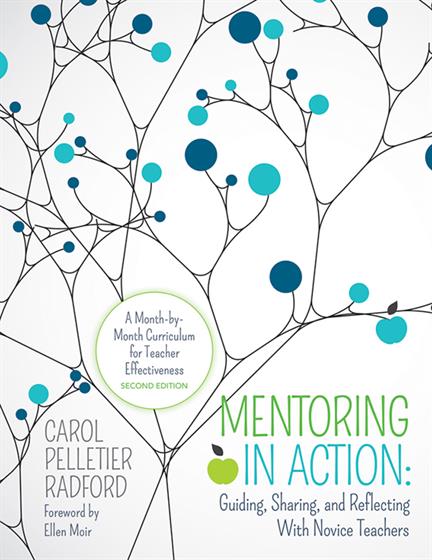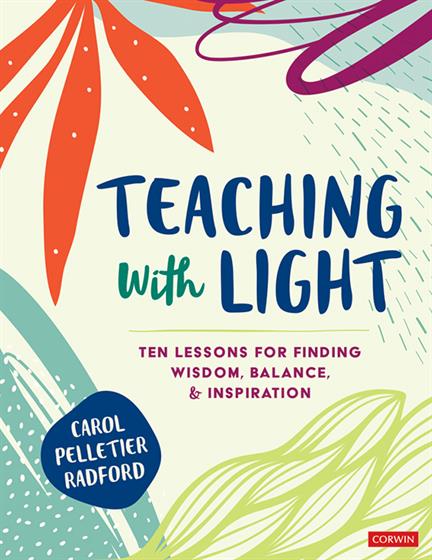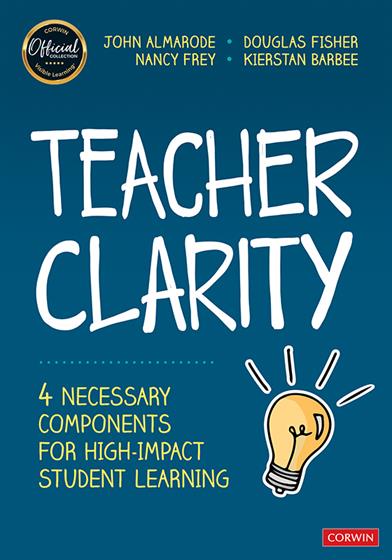NARRATOR 1: Welcome to Corwin's Teacher to Teacher Podcast with host Carol Pelletier Radford. Carol is an experienced
classroom teacher and university educator, founder of mentoringandaction.com, and author of four best-selling
professional books for teachers. She believes the best form of professional learning happens when teachers
engage in authentic conversations and share their wisdom.
In every episode, Carol and her guests share stories about pivotal moments in their careers, successful
classroom strategies, and personal actions they take to minimize stress and stay healthy. The Teacher to Teacher
podcast is a place to engage in authentic conversation and reflection with experienced educators. We hope these
conversations will energize you, keep you inspired, and remind you why you chose to become a teacher.
SONJA
HOLLINSALEXANDER:
Hello and welcome to the Teacher to Teacher Podcast. I'm Sonja Hollins-Alexander, associate vice president,
content advisor, and scholar here at Corwin. This season of the podcast focuses on mentoring and action. We
have such a rich episode for you today to kick off this season centered around the topic of intentional mentoring.
Our guests are John Almarode and Jaime Curley. John is a best-selling Corwin author, as well as a professor of
Education at James Madison University. Before his academic career, John started as a mathematics and science
teacher in Augusta County, Virginia. John also is one of my very best friends. We have spent years together
planning and thinking about professional learning, and I know that teachers are at the center of his heart.
Jaime Curley has been in education for 26 years. She has worked as a paraprofessional, special education
teacher, school psychologist and a special education administrator. She has been mentoring new teachers since
2011, and it is one of the most rewarding parts of the job.
Mentoring relationships play a crucial role in the personal and professional development of individuals. As
mentors, it is our responsibility to guide, support, and empower our mentees towards their goals and aspirations.
The conversation between John, Jaime, and Carol also touches on the challenges of mentoring the importance of
honest feedback, and the need to personalize and contextualize support for early career teachers.
The ultimate goal is to improve student learning by preparing mentors to have meaningful conversations with
their mentees. We hope that you enjoy this insightful conversation.
CAROL
RADFORD:
Hello, everyone. I am Carol and I'm here again in Season 4 to host the Teacher to Teacher Podcast. I chose this
theme, the season of mentoring. One reason is it's near and dear to my heart, and right now in education, a lot is
going on where beginning teachers are leaving the profession. And even our experienced teachers are leaving.
Our mentors are not ready to sign up and be mentors, whether formal or informal, so I felt like it was time to
unpack this topic. And we're beginning with Episode 1, and the title is Intentional Mentoring and what that
means. And I'll have a chance to give you my perspective.
But I'm here today with two guests. Jaime and John are here from two different perspectives. They don't know
each other because Teacher to Teacher is about having conversations with educators and listening to each other,
and maybe learning something different, a new perspective that we can put into our own context. So welcome,
Jaime and John. How are you today?
JAIME CURLEY: Good. How are you?
CAROL
RADFORD:
I'm doing well. John, what's going on with you? How are you?
JOHN
ALMARODE:
I am great, I'm glad to be here, and I'm looking forward to this conversation.
CAROL
RADFORD:
All right, so let's start the conversation. Let's bring it back to your own personal experience before we dive into
what intentional mentoring is and how we can use it. I want you to share a pivotal moment when you understood
that mentoring was really important. It hit you personally. Jaime, before we get there, though, could you also tell
us your background, who you are as a teacher, and then just jump into your pivotal moment?
JAIME CURLEY: Sure. So I started back in 1999 as a paraprofessional in a school district, and then became a special education
teacher and a school psychologist. And when I was a school psychologist, I was approached by the
superintendent to become a mentor for the district, so I did. And that's actually when I first became introduced to
mentoring.
And then now I'm an administrator. I'm an assistant superintendent of Student Services in Old Rochester, which is
in Massachusetts. And so one of my-- I think my biggest aha moment was when I was actually lucky enough to
mentor a brand new school psychologist and I was a school psychologist at the time. And she was really anxious
to even start the job.
And so one of the things that I was trying to figure out was how to calm her, how to show her that she actually is
more confident than she thinks she is. And so I was kind of struggling and doing a bunch of different things to try
and help her. It just so happened that shortly thereafter, I had a somewhat difficult meeting that I was going to
be presenting at.
So I had reached out to her, and I said, hey, would you mind looking at my report for me? I would really like a
second set of eyes to just go through it and make sure that it all makes sense. Did I miss anything? And what are
your thoughts on my presentation?
And so she was kind of shocked by that, thinking like, wow, you've been doing this for a while and you want my
advice? And I was like, yes. And that kind of changed things for her right away. She started to become more
confident.
And for me, the aha moment was really remembering myself back when I was a brand new school psychologist
and I was really nervous to get started and put myself out there. And I thought to myself, what would have
helped me? And so I tried that strategy, and it actually worked really well, and from there on out, I could just see
her slowly, slowly becoming more confident.
CAROL
RADFORD:
Thank you. I'm glad you brought this up because I think it's important for our listeners and for all of us to
understand that novice teachers are not confident or beginning-- wherever they are in the spectrum. And for you
to reach out in that way, I really-- it's amazing that it made the shift. John's going to introduce himself. But John,
do you want to react to that story? What did you hear and what Jaime had to say that was meaningful to you?
JOHN
ALMARODE:
So for me, I love that story. For me, though, it indicated the power of placing confidence and trust in our
colleagues that while there may be a mentoring relationship there, but building that confidence by first tapping
into someone's competence.
And so by asking that individual to read something and give feedback, you're speaking to that individual's
competence and acknowledging it and boosting that credibility because what the research tells us on motivation
is competence breeds confidence, not the other way around.
And so oftentimes, I think in mentoring relationships, we try to boost confidence without making sure we allow
mentors and mentees to experience competence, believing that it is a one-way street when, in fact, it's the
reverse. And so what stood out to me is her faith and trust and professional respect for that individual's
expertise. That then triggered or boosted that relationship in a way that had not been tapped into before.
CAROL
RADFORD:
John, thank you. Insightful, important for all of our listeners, and for all of us to hear that. So let's introduce
yourself, John. Who are you? You're already mentoring us.
JOHN
ALMARODE:
Yeah, so I'm a recovering secondary math and science teacher. I taught physics, chemistry, trig, precalculus
algebra 1, and then now have redirected my energy and time. This is what I do now. I work with preservice
teachers.
So now I work with the greatest students on the Planet of the Earth. All of them are future teachers in the pre-K
through 6 classroom. And some programs I work in are pre-K through 12 or secondary programs. And they're all
headed into their own classrooms in a few short years. So that's my direction now. I work with in the College of
Education at James Madison University.
CAROL
RADFORD:
Thank you for being here. So that's an important part of this intentional mentoring conversation. What's your aha
moment? And then we'll get into the conversation. What is brought up for you when we talk about-- thinking
about how important mentoring is?
JOHN
ALMARODE:
I think for me, it's the paradox-- the aha moment came from the paradox of the word intentional because so often
we associate intention with a forced match. And I certainly did. And while we can be intentional about mentoring
and we should be, it often leads us to that misconception that only by assigning someone a mentor can I be
intentional. It turns out that doesn't seem to be the case. And that's where my aha moment comes in.
I've had moments in my career, two in particular, that converge on this conversation, one where as someone who
received mentoring, it wasn't a forced mentor-mentee relationship, it wasn't an assigned relationship. We
naturally engaged in the mentor-mentee relationship. I was being mentored because we were after a common
goal, but our skill sets were complementary, not redundant.
And so we found ourselves working towards this goal, and this individual brought certain things to the table. I
brought certain things to the table and they weren't the same, and so it created this positive interdependence, so
then I was able to learn from this individual in pursuit of that goal because I had something to offer. So we're
back to that acknowledging competence to build confidence.
If you flip it, there have been times in my career where someone has come back and said to me, you were a real
mentor, and I never would have defined myself as one. I didn't believe myself to be in a mentor-mentee
relationship, but it just happened naturally. And I hope as we move through the conversation, we get to unpack
where the intentionality in that comes, even though it seems to be a by-chance matching, and how that's not
necessarily in contradiction to the concept of intentional mentoring.
CAROL
RADFORD:
Wow. Thank you, John. So what I'm taking away so far is the complexity of how we in our profession support and
induct people into the profession. So, John, you're working in preservive, Jaime is working inservice as an
assistant superintendent.
And full disclosure, Jaime and I have a relationship of intentional mentoring through preparing mentors. When I
was working in Massachusetts in an online hybrid program. Now I recognize you, Jaime, from a course a decade
ago of us grappling with how do we match and assign mentors to inservice teachers in an organized and
systematic way, and not just let that informal let me choose my mentor. So that is the dilemma, John, that you've
just put it on the table.
We all might not respond to an assigned mentor, but then how does a school district, when teachers are
inservice, match people for the ultimate intentional goal of helping kids learn in classrooms? That we could
unpack, is like, what's the purpose of mentoring? So, Jaime, I'm going to let you react, and then I'm going to jump
into my perspective of intentional mentoring, and we're going to just dive in. What do you think about what John
had to say?
JAIME CURLEY: Oh, so back to what John had to say, I agree with you about the forced matches. Sometimes that can be difficult,
and I feel like sometimes it's matching people appropriately and who you think might go well together
personality-wise or content-wise. Sometimes it doesn't always work out, and I'll give an example.
At one time, I was assigned to be a mentor of a kindergarten teacher. And so I was like, well, I don't really know
too much about the kindergarten content. I can talk to her a lot about social and emotional learning and
behaviour management, setup of your classroom and whatnot. But in terms of the curriculum, that was not my
area of forte.
So what we did was I would meet with her once a week, and we would talk about all those things that I just
mentioned. But then the next week, we would do a group mentoring session. So there was another kindergarten
teacher that was a mentor to another kindergarten teacher. So that one was really based around the
kindergarten curriculum and whatnot.
So although I may not have been a perfect match for her content-wise, I tried to build that out so that we did
group mentoring every other week. So she could get some of that content as well.
And I just think about, Carol, when you taught that class last decade, which seems crazy, you talked a lot about,
who's at your table? The person that you're assigned to as your mentor/mentee, they're not going to be your end
all, be all. So who else kind of sits around that table who helps support you? And that's one thing that I always
teach when I'm teaching people to be-- new teachers to be mentors.
And I just think it's really important because we're not-- one person can't give you all that you need. So it's really
building out, who can I go to for this? And who can help better support me here?
CAROL
RADFORD:
Thanks, Jaime, for that. So let me just-- so let's shift and dive in a little deeper to this conversation and this
concept of intentional mentoring. And the board of mentors that you're bringing up that I introduced in my books
a decade ago is part of that conversation, is the knowingness that one person can't be the whole thing. And I
used to call it the dating game, that force mentoring.
But my experience of mentoring on the preservice side is I was the cooperating teacher that John would be
coming to say, could we send a student teacher to you and have you mentor them, be a cooperating teacher
throughout the preservice courses and all of that? And I remember being like a mid-career teacher or maybe
late-beginning teacher and not knowing what to do.
So here I was a mentor, having people in my classroom and going to the university and saying, well, what do you
want me to do? And that mentoring was just be a good teacher, let them watch you, and it wasn't enough for me.
And, again, it was a forced match in a way, or it was a no match. It was just like, who is willing to take a student
teacher? And many teachers said no.
So what happened in my life is that I took student teachers and loved it. And then I developed my own
curriculum for mentoring and the steps that it took to mentor when I had a student teacher in my classroom. And
that led to my first book on coaching student teachers.
The university loved it because then we were having this conversation, but then there was also some
delicateness for the department chair who said like, what are you doing? We do the curriculum. We're the
preservice leaders, and you're just the cooperating teacher. You're just doing that part, which turns out to me to
be the whole part. It's like this is the practice part. This is the practicum.
Long story short, I ended up working in higher ed for the next two decades because I felt I wanted it to be more
intentional with this preservice mentoring, which then led me to the work that Jaime took the course, and
developing an on-purpose program or curriculum for mentors, either preservice or inservice who are coaching
and inducting people into this profession that I love.
So the beginning stages when I looked around in my own school, every mentor was doing it differently. There
was no common language. They were all great teachers. They were chosen because of that, but they didn't have
the articulation or preparation as to what to talk about because there wasn't anybody in the school. And that was
the number one question when I wrote my first book, The Teachers, because I was still very much a teacher.
I taught for 21 years in elementary school. They would just say, can-- I go, I'm writing a book. I'm going to help.
We're going to do this. And they're like, what are we supposed to be talking about? What do we do in the
meetings? Like, Jaime had to create-- I'm going to have her read my document, which led to this wonderful shift,
but it wasn't planned. It was pulling from your own experience, like, what should I do next?
So the intentional part for my work became, how do we create and prepare mentors for purposeful conversations
that will lead to student learning? So I always said, if you're having a conversation that relates to where the copy
machine is or the great restaurants in town, we call that orientation. So it was like having a different conversation
for orienting someone, and really, my definition 10 years ago became talking about student learning or now it's
your own well-being. I have expanded.
So what has happened is the paradigm has also shifted, as John mentioned, about collaborative goals. So my
contribution to the profession is shifting the paradigm to collaborative conversations. A book that the novice
teacher actually-- I wrote two books, one for the novice and one for the mentor. They get the same exact stuff,
because why? We want the mentee to come to the conversation prepared as well.
So that's kind of my direction of what I think of intentional mentoring. And, yeah, there's a lot of ways we can go
off of that. Jaime, do you want to react because you've worked with the curriculum a bit? And then dive in and
share your new ideas.
JAIME CURLEY: Yeah, so, I mean, the books are great because I think being in special education, a lot of my-- pretty much most
of my career, I was-- there's lots of structures in special education. And so the books really helped me structure
my conversations with new teachers.
The other thing that I really like about the books is that you can skip a chapter if you need to if you feel like the
mentee is really all set with the way they've set up their classroom or having parent-teacher conferences or what
it might be, but they might need a lot help on the evaluation system.
So I think that the beauty of the book is you can kind of pick and choose what you want to work on with your new
teacher because, let's face it, when you have a new teacher that you're working with, they could be new to the
district. They could be a career changer, they could be right out of school.
And what you learn in school, the theory that you're learning and the practicality of things, when you actually put
them into action, I like the name of the book, Mentoring, and when you put things into action in the classroom,
it's usually quite different. And there's a lot of things that you run into that you weren't expecting. So I like the
idea of the book because it keeps you on track, but it also allows you the flexibility to jump around based on the
specific needs of the teacher that you're working with.
CAROL
RADFORD:
So let's talk about needs. John, you jump in and react to my little story of how I got into mentoring, and then I
want to talk about novice teacher needs.
JOHN
ALMARODE:
So I'm going to jump right to novice teacher needs because I think this is what makes this such a complex-- what
brings many of us to mentoring, right?
CAROL
RADFORD:
Yes. Yes.
JOHN
ALMARODE:
So your story, and then there are some universal concepts, hidden gems in that story that really zeroing in on the
needs of novice teachers. It's one of the challenges that I often resonate with when researchers say, hey, teacher
ed doesn't have a very high effect size. And so then we all of a sudden, well, something's wrong. Hold on a
second.
Teacher's goal is to get them ready to enter into their first classroom, period. So then often the studies on
teacher ed are like, well, teachers are not-- their success is not correlated with where they went to college
because our job is to get them to their first year.
And then once they're in the school system, then we get to contextualize the environment. So for example, you're
hired in, say, Augusta County public schools, where I am versus Dallas ISD versus Burlington, Massachusetts
versus Las Vegas, Nevada. There is no reasonable expectation that a teacher preparation or preservice teacher
program can get them ready for all those contexts.
So then there's a clear need for that induction. And we do this in medicine. We do this in the business world. We
do this in-- when they come out of law school, there's this apprenticeship-type approach. So then when it comes
to the needs, I think one of the challenges we have is this compulsion to come up with a list. These are the
characteristics that a novice-- these are the things a novice teacher needs. Here's the list of 10, and now go
design your-- here are the 10. Hold on a second. Again.
CAROL
RADFORD:
Right.
JOHN
ALMARODE:
That 10 may not apply to everybody because we're all starting out at different spots in our own professional
journey just like we love to identify that students are starting out at different locations in their journey when
they're in 5th grade math. So I think when we talk about needs of early career teachers, we have to make sure
that we personalize it, that we contextualize it, and that we scaffold it. The very same thing we would do.
And so when it comes to conversations about those needs, any mentoring model, any coaching model must make
room for us to diagnose and discover where is this teacher-learner now in his, her, or their journey? Where is the
mentor in his, her, or their journey? And how do we then build a framework that allows that mutual focus on a
common goal?
CAROL
RADFORD:
Right. Right. Right. I love what you're saying because it comes back to that beginning story, and that the idea of
assigning a mentor, finding a mentor who has mutual goals, blah, blah, blah. But for me, it all comes back to
preparing the mentor because if the mentors are prepared in a common language, whatever model, mine,
somebody else's, some framework, just pick a framework, then there's less chance of that mismatch or that
whatever because there's a common language in the district.
So it shouldn't matter, but we can discuss this. Who is assigned as a mentor if they're all prepared? And what you
did, Jaime, mentoring a kindergarten teacher, I like mentoring for pedagogy. So all my work and my books, we
can't do the content. Everybody can't do everything.
But if it's mentoring for teaching pedagogy, I see that K-12, I see that higher ed. I see some skills I used in 5th
grade teaching that I used in college teaching. It's the same. Engage your learner, engage your audience. But we
have to teach the mentors. So Jaime, tell me about mentor preparation that can minimize the anxiety of that
matching process and all that dating game stuff like finding the right personality and so forth. Talk about that a
little bit. What's happening in school districts? What's the struggle?
JAIME CURLEY: Yeah, I mean I think that that is real. I think what happens in my experience is that you have a list of certain
trained mentors and then you're trying to match them up with who-- to the best you can that are in the same
building just to make things easier or whatnot. So those things, certainly are struggles.
The one thing that we're trying to do in my previous district and then here in my new district is really trying to
train as many people as possible because not only if you are a true assigned mentor like what John was talking
about earlier, but you could be an informal mentor in some way, shape, or form.
Or you don't even know that you're going to be mentoring somebody because maybe your classroom is next door
to them and you just build a connection, and you end up kind of informally mentoring somebody which just
sometimes can turn into these beautiful relationships.
I think one of the biggest things about mentoring relationships and one of the things that we talk about a lot with
our when we're training new teachers to be mentors, is just around that confidentiality of the relationship, and
really trying to be non-judgmental and make sure you're putting yourself in the shoes of the new teacher. Make it
a relationship where the person can come back to you and have those honest conversations because the goal of
mentoring is to support that new teacher and to keep them in the profession.
Because as you had started earlier in the conversation, Carol, around people are leaving the profession, it's
really, really important to find out what we can do and how we can match our skill set to the needs of the new
teacher so that they really, truly feel supported. And so I think that's one of the things. And I think maybe John
alluded to this earlier, maybe it was around the confidence.
But how do we build confidence within people? And I think it's having those honest conversations. It's not just
giving them the, oh, you're doing great, but it's having those true, honest conversations like, you know what,
going in to observe the teacher and say you know what, you did a really good job with X, but next time maybe
you could try this or what could you have done better here?
Because I think if you're just giving non-honest feedback but just polite feedback all the time, then you're missing
the mark because the goal is you want to build that competence as you're working through with the relationship.
So I think, again, honesty, trusting--
CAROL
RADFORD:
Confidentiality.
JAIME CURLEY: Confidentiality.
CAROL
RADFORD:
So, John, I want to go back to something you said because it is the preservice mentoring, and my story of being a
cooperating teacher. What are you doing to prepare the mentors who are working with your graduates? And
we're lucky that some people are still going to college to become teachers because there's so many alternative
routes that districts like Jaime's are having teachers that they're mentoring that did not get any of the prep that
you are giving.
So I know there's a couple of questions in there, but preparing the mentors, we could talk about this forever
because we're all interested in it. But what are you doing to help your mentors not have the experience that I
had?
JOHN
ALMARODE:
Yeah, so there are a couple of levels of that. So if you are hosting one of our practicum students, you get a
certain level of professional support from the university to host a practicum student. If you are a cooperating
teacher from one of our student teachers, which is the next level up of clinical placements, then you get an
additional type of support and you become what we call clinical faculty. And that's run from many universities
across the country.
In fact, probably all of them that have teacher education programs, there's an education support center that
manages clinical faculty. These are the expectations. Here are some suggestions. And then, of course, if you are
a mentor within the district for a new teacher that is hired, that's handled in-house by the district, and we have
little to no say in that at all. What's interesting is how-- the message that training sends. I'm sorry, that
Professional Learning Center training because they're not.
CAROL
RADFORD:
I know. I go back and forth.
JOHN
ALMARODE:
That professional learning, the message is because one of the challenges that happens in the literature on
mentoring and supporting teachers, it's one of the reasons why coaching doesn't have the strongest effect size
either. It is because oftentimes those coaches and mentors will say, this is how I do it in my classroom. You
should do it this way in yours.
CAROL
RADFORD:
Thank you. Yes, that is not the same as mentoring.
JOHN
ALMARODE:
And we know it's not effective because there's teacher personality, there teacher attributes, there are student
dynamics. And then we often subscribe to a certain approach to teaching. For example, you can walk into a
science classroom and say, all kids should learn science through inquiry. Well, that's not true at all. And there's
no research to support that at all.
Instead, there are lots of models of instruction. There are lots of evidence-based practices, and it comes down to
how teachers make those decisions. So the new research we have is a lot about the decision-making and the
thinking of the teacher, not necessarily what the teacher does in terms of practice.
And so how do we support that mentoring where we are far from that at this point, because we're still-- I think
many of us are still stuck in that, OK, what is the bare minimum we need to do? Because we have limited time.
Everybody has limited time.
And while the University does make strides towards this, we try to make huge strides towards this. Early career
teachers and mentors are all-- we're all experiencing it. There's a lot going on. We have limited time. How do you
do this? How do you do it?
CAROL
RADFORD:
Well, I don't know. Jaime, any ideas of what John is introducing now as more challenges and ways to help our
novice teachers?
JAIME CURLEY: Yeah, I mean, I think, John, to respond specifically to your teach-like-me, do-as-I-do, you do see that often. And so
I think that's one of the things when you're training new mentors is to really teach them that you need to pay
attention to the specific needs of the mentee and it's not about you, it's about them.
And so finding, like I had said earlier, the right approach, it's trial and error at times because it's kind of working
with students when you're working with students on challenging behaviors and you're trying to say, oh, well, let
me try this, let me try that, it's the same thing. I think working with new teachers is that you don't necessarily
know, as you're getting to know each other, what strategy or what may work best.
So sometimes it's trial and error, and then sometimes, again, it's reaching out to other people that-- maybe
behavior class. If a new teacher is struggling with classroom management and that's not my strength, it might be
reaching out to somebody else in the building that can provide the support in that area. And so trying to figure all
that out, it's super complex. Not a one-size-fits-all.
CAROL
RADFORD:
--than we think. It's more. And I think the ultimate goal with John's program insert preservice, inservice, it is
about back to student learning. It's having conversations, but we need to prepare the mentors to know how to
have that conversation. Otherwise, it's the default.
Listen, I have a successful way to do it, just copy my way, but it doesn't-- we know it doesn't work that way
because we've all been in schools and we've all been teachers, and we've looked around and we see that context
does matter. So what are the big ideas then in intentional mentoring, as we draw this to a close? What are some
of the big ideas that we want our listeners to take away other than, oh, my God, this is so complicated, there's no
way we can do this?
How do we want to move this discussion forward to help our beginning teachers and to help our mentors want to
be mentors? Why would anybody want to take a student teacher? Why would anybody want to mentor? John,
what's percolating? What's rising to the top as some big ideas?
JOHN
ALMARODE:
For me, we've already talked about this in this conversation, the idea where the copier is, how to fill out a field
trip form, how to take the students to lunch. No, not on the list. However, what the research is telling us about
effective teaching is it's not what we teach or how we teach, it's how we think about our teaching.
So as a mentor, am I spending more time showing my mentees what to do and saying, hey, watch this, or am I
engaging in more conversations about the type of thinking that goes into the decisions we make each and every
day in our classroom?
Why did you choose to introduce the content this way? Why did you choose to put the groups together that way?
Why is it you decided to use that resource and not this resource? Because at the end of the day, when we flip
that and focus too much on the doing, we'll make major mistakes.
Well, I wouldn't have used that text, I'd use that one. You can't say that. You don't know because I could use text
set that's very different from Jaime's. But in my class, they flop and Jaime's classroom, they thrive. So it's not
about the text set, it's about how it's implemented.
CAROL
RADFORD:
Very insightful. I love that, and I want to underscore what you're saying for mentors because it is who we are and
what we bring to that conversation. And then there are multiple things we can talk about.
But you're kind of going back to your example, your aha moment of when you were a mentor, but you didn't
know intentionally that you were being a mentor. So that's kind of interesting that we've come back full circle.
Jaime, big idea that surfaced for you in this conversation that's having you think a little bit more about this.
JAIME CURLEY: Yeah, I think to back up what John said, too, I mean, I think it's really understanding why. The why behind
decisions because when you-- whenever a situation happens, working with an administrator or a teacher or
whatever, it's like we'll find out why. Why did this happen? Why did that happen? And really trying to dig down.
I think sometimes it's easy at a surface level to make assumptions or judgments that maybe, yeah, you should
have done it this way, or should have-- but there could be very good reason why the teacher did it that way. And
just by going and observing or seeing something, you don't know that.
So I think it's so important to ask those questions to really truly listen, not listen to respond, but really listen to
the reasons why. And then I think, again, providing that honest feedback to folks, because the goal is, again, to
keep them in the profession and to build their confidence.
CAROL
RADFORD:
I love it. Thank you both. So I want to get to a place that you can share the projects and the work that you're
doing, but before we get there, do either of you have a time-saving tip for mentors who might be listening that
you can offer our listeners, like something that comes up? John, what have you got?
JOHN
ALMARODE:
I would say untease the siloed approach. For example, some of the mentors we work with are like, well, I do my
mentoring on Tuesdays and Thursdays from 3:00. Stop. I would say stop doing that. Instead, let's take a page out
of the med school book.
If I'm an attending and that's some of the work that I'm doing now with medical schools and attending
physicians. If I'm mentoring a young future doctor, I don't separate that out. That individual comes along with
me. They're in the operating room with me. They go to rounds. They participate in lectures. It's the cognitive
apprenticeship model.
And so what I would say, one way to save time is stop treating our mentoring tasks, roles, obligations, whatever
word you want to use. It is not separate from everything else we do. It is what we do.
CAROL
RADFORD:
Love it. So it's who you are. Thank you for that. Jaime, what have you got?
JAIME CURLEY: Yeah, I mean, I think as a mentor group within a district, meeting together regularly and talking about what are
our challenges? What are you seeing? Are there common themes across the district? Are we missing it here or is
it over here? What are you struggling with? What is your new teacher struggling with?
And having those conversations because maybe that provides more opportunity for professional development in
this area or small group mentoring in another area. So I think really trying to work together as a team whenever
possible to be able to support the new teachers as much as we can.
CAROL
RADFORD:
So my tip that I'm going to add to the mix is having five minute meetings intentionally to compliment. I call them
compliment meetings, to compliment something that a novice teacher or beginning teacher is doing. So the way
that works is the mentor observes and sees something competent that is going on.
We've talked about competence because novices usually are always focusing on what they aren't doing well, and
that brings them down. So writing it out, giving a sticky note so they can put it on their refrigerator, but
intentionally giving praise, not just saying, I see you're doing a good job, but just like we do with the students.
Intentionally telling them what they're doing well.
This has been I could go on forever. I love talking about mentoring, and the two of you were fabulous guests.
Before we close the podcast, though, I'd like to just hear what you're both doing for your interest. John, you
mentioned the medical a couple of times, and I know you work with Visible Learning, so tell me what's going on,
books, articles.
JOHN
ALMARODE:
So to be quite honest, a large percentage of my time is spent with a 13-year-old and a 10-year-old who are
involved in [INAUDIBLE] stuff.
CAROL
RADFORD:
You're a dad. OK.
JOHN
ALMARODE:
So that's number one. Number two, we're doing some work now on the concept of struggle in the classroom, and
so we're investigating what that looks like, feels like, and sounds like. And we're also looking at how feedback
plays out in complex situations.
While the operating room is far from 5th grade math or 7th grade language arts or 10th grade driver's education,
we're trying to understand how feedback happens in a very complex or what's called a wicked environment,
where it's not as easy as yes, the widget went in the right hole. No, the widget did not.
And so we're starting with medicine in hopes to pull some generalizations that can help us understand how it
happens in the cafeteria, the hallways, or the calculus classroom. So those are the two big ones.
CAROL
RADFORD:
Good. Any books that we need to know about that our listeners could relate to or articles or a direction that they
could learn more about you, or how do they find you?
JOHN
ALMARODE:
Sure, the Corwin website is the best way to grab a hold of me, but you can also find me on the university
website. We just released. Teacher clarity will be out in the next couple of weeks. The new version of teacher
clarity is out. We just did a second edition of the teacher clarity playbook.
We also just finished a coaching flip book. It is a resource to use when engaged in coaching. It's not an anchor
book where you read from cover to cover, but it's a coaching flip book that you go to where you need to go when
you're about to engage in some aspect of the coaching cycle, and that's linked directly to Visible Learning. And
coming soon to a bookshelf near you, we are also getting ready to dive into coaching in the Visible Learning
classroom. So those are some things that are out and then coming in the very near future.
CAROL
RADFORD:
Thanks, John. I appreciate all that you're doing and your wisdom and your insights. Yeah, Jaime, what are you
most interested in the districts, and how is this conversation helping you?
JAIME CURLEY: Yeah, I mean, so I think it's always good to have these conversations with people that are just excited about
certain topics as you are. It kind of re-energizes you and gives you some new ideas to bring back. I think for me,
I'm brand new to the district this year. I just started in August, so I'm really embracing the opportunity to learn as
much as I can about-- it's a regional district, so there's six schools, it's three different towns, and then we're
regional 7 through 12.
So one of the things that I'm really trying to work on this year is really to audit what is happening in each of the
buildings and try and create consistency across all of the different districts so that we're around that common
language that we've talked a lot about today, making sure that when one school is doing something, there's
common language when we're all getting together for professional development opportunities and whatnot.
I think one of the other exciting things is last year there was a lot of focus. We started a new-- they started a new
reading program before I started, and they also had gone through the strategic plan. And so a lot of what was
worked on last year was under objectives 1 and 2, which is a lot around teaching and learning.
But one of the things that we're starting to work on this year is around student supports. And so that's kind of
where I come into play. And that's where I'm kind of doing the audits across all the schools to find out what
supports we have in place for students to make sure that they are successful.
CAROL
RADFORD:
And our mentors who are listening are busy. All teachers can relate to this conversation. I'm grateful to both of
you for giving your insights, and I'm going to close with two messages. One is we are offering an idea for you all
to think about the listeners call podcast PD.
So Teacher to Teacher, these episodes we're encouraging school district leaders like you, Jaime and preservice
leaders, John, to come up with a format where your preservice teachers could start listening to these episodes
and give them credit for doing it as part of one of their classes, so they can gain these insights before they jump
into the classroom.
And the same with Jaime, why not give them inservice credits? And we're already piloting in a couple of districts,
and 20 teachers signed up for day one because they didn't have to go to a meeting. They could have put on their
headphones and listen to the wisdom. So you'll find in the notes for this launching Season 4 ways that you can
use these insights as a professional learning for teachers to listen to these conversations as well.
And I'm going to close with two affirmations. This affirmation is for the mentors who are listening, and guess
what? We're all mentors. And it is. I will listen to my novice teachers' needs and be a compassionate mentor. And
for those of us who are mentees, and many of us are mentees as well, I will intuitively listen to my own needs
and share them with my mentor.
So thank you both for being here and thanks to our listeners. Yes, we're launching Season 4T eacher to Teacher
and tune in because Episode 2 is purposeful mentoring conversations with Doug Fischer and a beginning teacher,
Vanessa Smith. So thank you, Jaime. Thank you, John.
JAIME CURLEY: Thank you.
NARRATOR 1: Thanks, everyone, for joining today's Teacher to Teacher conversation. We hope this time together energized
you, inspired you, and reminded you why you chose to become a teacher. You can purchase any of Carol's books
and any books mentioned in the podcast online at www.corwin.com. Please leave a review and share this
podcast with your colleagues. Thank you for listening to the Corwin Teacher to Teacher podcast, a place to share
teacher wisdom and engage in authentic conversations with experienced educators.
NARRATOR 2: Come explore Corwin's free new teacher toolkit and resources. We've curated these resources based on
extensive research from teachers, coaches, and principals alike. Whether you are brand new or a veteran
teacher, find ready-to-go teaching tools at corwin.com today.

